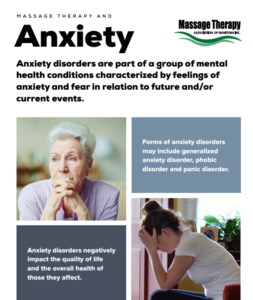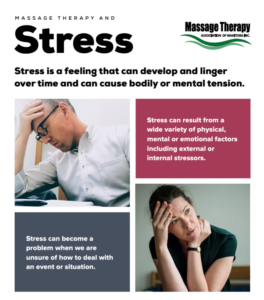Benefits of Massage Therapy – Anxiety & Stress
Stress is something we experience as we adjust to our continually changing environment, it can be both positive and negative.
Positive stress can encourage action and raise our awareness and excitement. Negative stress can cause feelings of anxiety, depression, create sleep loss, anger, high blood pressure and other medical problems.
Many people seek out massage therapy for the sense of relaxation it brings them. Massage therapy can help reduce the negative outcomes of stress and help to induce relaxation.
They feel a sense of calm and peace of mind from both the tranquil atmosphere and the treatment itself. However, if someone is looking for “just a relaxation massage” it doesn’t mean their treatment is any less clinically indicated or beneficial to their overall health. Massage has been shown to reduce stress and anxiety, which contribute to overall physical wellbeing.
 Anxiety
Anxiety
Anxiety and related disorders negatively impact the quality of life and the overall health of those they affect. Massage therapy is one option for reducing the physical symptoms that are associated with anxiety. One recent study looked at the effects of massage therapy on the vital signs and anxiety in healthy women. In this study, massage therapy was successful in significantly reducing pulse, respiratory rate, and systolic blood pressure.
Another study evaluated the effectiveness of a relaxation or wellness massage therapy program in reducing stress, anxiety and aggression on a young adult psychiatric inpatient unit. A 20 min massage therapy session was offered daily to patients during their period of hospitalization and several different tests and variables were used to measure patient outcomes at admission and discharge from the unit. This study found that there was a significant reduction in self-reported anxiety, resting heart rate, and cortisol levels immediately following the initial and final massage therapy treatments. Massage therapy had immediate beneficial effects on anxiety-related measures and may be a useful de-escalating tool for reducing stress and anxiety in acutely hospitalized psychiatric patients.
 Stress
Stress
Everyone experiences some stress in their lives, whether it’s from work or personal circumstances. One study explores the effects of massage therapy on the occupational stress of those working in intensive care. This study recommends that massage therapy be used for nurses in intensive care units to reduce their stress, promote mental health and prevent the decrease in the quality of their working lives.
One report reviewed the literature surrounding the effect of massage therapy on reducing physiological measures of stress, including hormonal as well as physical variables. The review indicated that massage therapy may have several physiological measures of stress reduction, specifically salivary cortisol and heart rate, when assessed immediately after massage therapy.
Massage Therapy and Mental Health
Occupational and other stresses can lead to a range of significant health issues, and massage therapy is one viable way of coping with those stressors. Anxiety disorders also negatively impact quality of life, and massage therapy is one of the complementary options that can help address the physical symptoms of those disorders.
Massage therapy is a clinically valuable treatment option which reduces muscle tension and soreness, improves sleep, promotes relaxation which help decrease stress and anxiety.
References
Garner B, Phillips LJ, Schmidt HM, Markulev C, O’Connor J., Wood SJ, Berger GE, Burnett P, McGorry PD. Pilot study evaluating the effect of massage therapy on stress, anxiety, and aggression in a young adult psychiatric inpatient unit. Aust N Z J Psychiatry. 2008 May; 42(5):414–422.
Gholami-Motlagh F, Jouzi M, Soleymani B. Comparing the effects of two Swedish massage techniques on the vital signs and anxiety of healthy women. Iran J Nurs Midwifery Res. 2016 Jul-Aug; 21(4):402-409.
Moraska A, Pollini RA, Boulanger K, Brooks MZ, Teitlebaum L. Physiological Adjustments to Stress Measures Following Massage Therapy: A Review of the Literature. Evid Based Complement Altern Med. 2010 Dec; 7(4):409–418.
Nazari F, Mirzamohamadi M, Yousefi H. The effect of massage therapy on occupational stress of Intensive Care Unit nurses. Iran J Nurs Midwifery Res. 2015 Jul-Aug; 20(4):508-515.